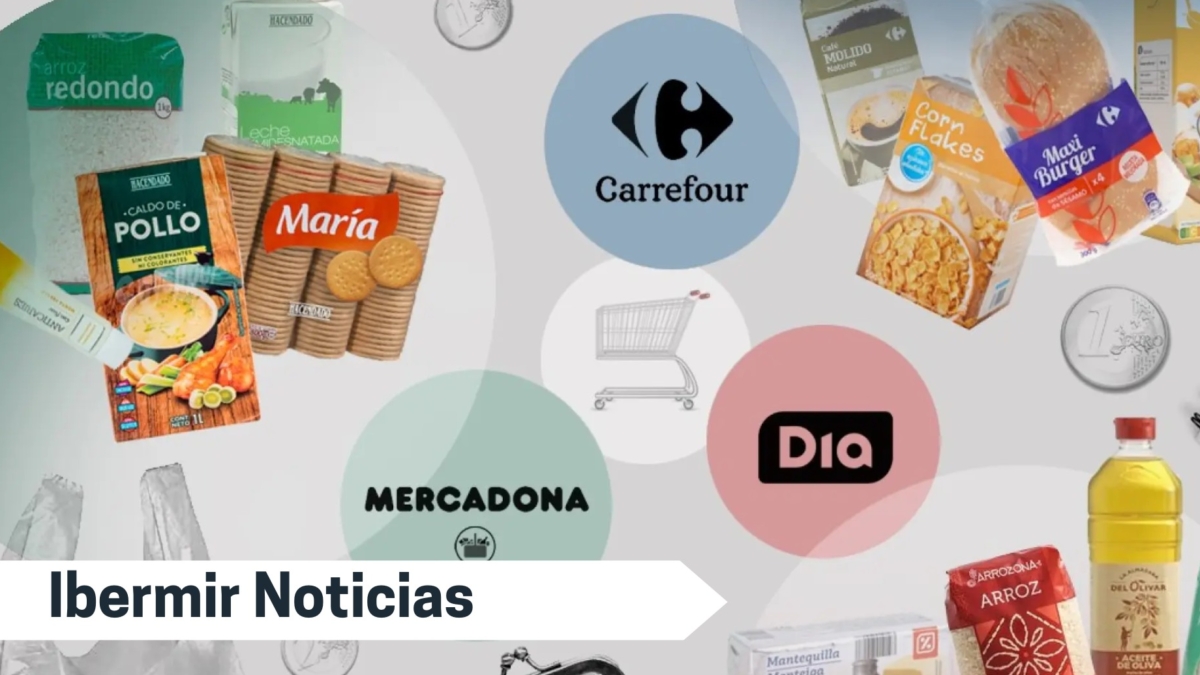Private label products are advancing unabated in Spain. Faced with the steep rise in prices and with nearly 50% average market share, all distribution chains, without exception, are strengthening the weight of their own brands at the expense of manufacturers.
According to data from the consultancy Kantar Worldpanel, private label brands are growing with varying degrees of strength in both companies where they already had a very relevant presence, such as Mercadona, Lidl, Aldi, or Dia, and in those where their participation was previously smaller, such as Carrefour, Alcampo, Eroski, El Corte Inglés, or even the IFA Group. Major manufacturers admit that “this is a widespread phenomenon” and warn, in this regard, that as a consequence of this, there is a massive withdrawal of their products from the shelves. “They are pushing us out of the market” to strengthen their own brands,” they assert.
At Lidl, for example, private label products have reached 81.9% of total sales, almost two points more than a year ago, and at Mercadona, Hacendado and the rest of its brands already represent 74.5% of the business, which is six tenths more than the 73.9% a year ago. Considering that between these two chains, according to Kantar, they capture more than a third of the market share, the space left for manufacturers to grow is increasingly reduced.
The problem, as warned by the food and consumer goods industry, is that their case is not an exception. In fact, there are two other chains where private label brands already account for more than 50% of their sales: Aldi, which has increased the presence of its own brand by another three tenths, up to 61.1% of the total business, and Dia, where it already represents 56.3% of sales after growing by more than two percentage points compared to last year.
It is also noteworthy the strong growth that private label brands are experiencing in chains where their presence was previously more limited. This is happening at Consum, where it now reaches 35.9%, almost three points more than the 33% it represented a year ago, and to a lesser extent also at Carrefour or Eroski, with growth of almost two points, up to 31.4% and 28.4% of the total, respectively. The same occurs in the rest of the chains, where the presence of distribution brands is still small, but also growing. This is the case at Alcampo, the IFA group, or El Corte Inglés, where although the presence of manufacturers remains very important, private label products already account for 15.2% of their sales, compared to the 14.7% it represented in 2023.
Major manufacturers denounce that behind this strategy lies the supermarkets’ intention to expel them from the market. According to Promarca, the association defending major manufacturers, the six major chains present in the market – Mercadona, Carrefour, Lidl, Eroski, Dia, and Alcampo – have withdrawn a total of 3,666 references in the last six years, while increasing their own by 1,818. Thus, and only so far this year, Carrefour has removed Pepsico group products from its shelves, accusing it of an unjustified price increase; Dia has removed Bimbo from its stores, and Mercadona has withdrawn Leche Pascual.
Ignacio Larracoecha, the president of Promarca, assures that it is a phenomenon that does not respond in any case to meeting consumer demands but rather to promoting their own brands through alleged unfair competition practices. “Unfair competition” “They are applying higher trade margins to manufacturers’ brands, which causes their products to become more expensive. In this way, they deny consumers access, with the consequent decrease in market variety, and prevent innovations from reaching supermarket shelves,” explains Larracoechea. The assortment of manufacturers in the six major chains analyzed by Kantar has thus been reduced by 23% since 2019. According to their data, Mercadona has cut the number of manufacturer references by 45%, Dia by 42%, Eroski by 31%, Alcampo by 23%, Carrefour by 20%, and Lidl by 14%. The consequence, according to Larracoechea, is already evident.
“They are closing factories and destroying jobs, also causing a price increase,” asserts the manufacturers’ representative unequivocally. In the midst of all this battle, distribution is insisting on supermarkets to adjust their margins in order to continue lowering prices, something they consider essential to recover sales and boost consumption. However, the food industry, which has been experiencing a steep increase in costs for the past two years, categorically refuses to take any measures in this direction.
Source: elEconomista

